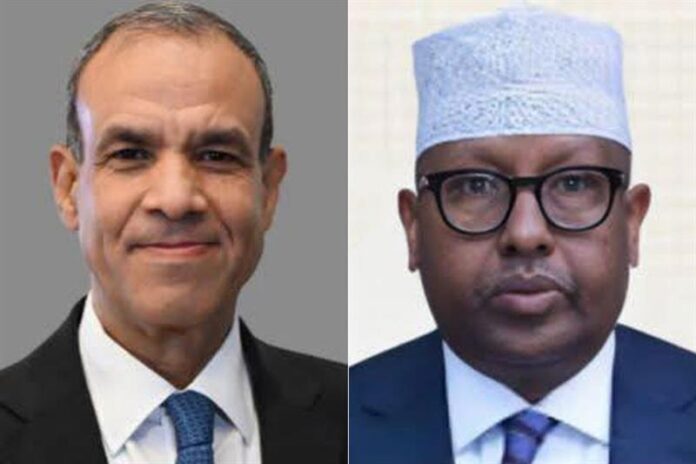Facebook Twitter (X) Instagram Somali Magazine - People's Magazine
Egypt reaffirms support for Somalia’s stability, pledging continued political, security, and humanitarian assistance as the Horn of Africa nation navigates a critical transition from international peacekeeping to national-led security. The commitment was reiterated by Egypt’s Foreign Minister Badr Abdelatty during a high-level virtual session of the African Union Peace and Security Council (PSC), where ministers gathered to assess Somalia’s progress and the handover from the African Union Transition Mission in Somalia (ATMIS) to the newly formed AU Support and Stabilization Mission in Somalia (AUSSOM).
Abdelatty praised the Somali government’s efforts to restore order, strengthen governance, and build resilient state institutions, describing them as “commendable strides toward national recovery.” He emphasized Egypt’s unwavering support for Somalia’s sovereignty, unity, and territorial integrity, and called for a smooth and well-coordinated transition to AUSSOM to preserve the hard-won security gains achieved over the past decade.
The Egyptian minister also voiced concern over the persistent threat posed by terrorist groups, particularly Al-Shabaab, warning that any security vacuum during the transition could be exploited by extremists. He urged the international community to ensure regular and sustainable funding for AUSSOM, cautioning that underfunding would not only jeopardize Somalia’s stability but also threaten maritime trade routes and global security.
“Somalia’s security is not just a regional issue—it is a global imperative,” Abdelatty said. “We must not allow the progress made to unravel due to financial neglect or political fatigue.”
Egypt’s support extends beyond diplomacy. Abdelatty highlighted Cairo’s ongoing bilateral and multilateral contributions, including capacity-building programs, personnel training, and institutional support for Somalia’s security and civil sectors. He also reaffirmed Egypt’s commitment to humanitarian assistance, particularly in areas affected by conflict and climate shocks.

The PSC session comes at a pivotal moment for Somalia, which is preparing for its 2026 elections and working to consolidate gains made in the fight against Al-Shabaab. The Somali National Army, backed by local militias and international partners, has reclaimed significant territory in recent months. However, the drawdown of ATMIS forces and the rollout of AUSSOM have raised concerns about potential gaps in security coverage.
Abdelatty’s remarks echoed those made earlier this year by Egyptian Prime Minister Mostafa Madbouly, who warned that shifting international priorities in 2024 had allowed Al-Shabaab to regroup and undermine progress made by Somali forces in 2022 and 2023. Speaking at the AUSSOM summit in Entebbe, Uganda, Madbouly stressed the need for robust logistical and financial support to empower Somali forces to maintain control and prevent a resurgence of violence.
Egypt’s diplomatic stance has been consistent in supporting Somali President Hassan Sheikh Mohamud’s vision of a unified, peaceful, and self-reliant Somalia. Cairo has also rejected any moves that threaten Somalia’s territorial integrity, including the controversial maritime agreement signed between Ethiopia and the breakaway region of Somaliland earlier this year.
As the AU and its partners work to operationalize AUSSOM, Egypt’s proactive engagement is being viewed as a stabilizing force in a region marked by shifting alliances and complex security dynamics. Observers say Cairo’s involvement could help bridge gaps between Somalia and other regional actors, while reinforcing the AU’s role in conflict resolution and peacebuilding.
With the transition to AUSSOM underway and Somalia’s political roadmap gaining momentum, Egypt’s reaffirmed support sends a strong message of solidarity and strategic partnership. Whether this will translate into lasting peace and institutional resilience remains to be seen, but for now, Somalia can count on Cairo’s backing as it charts a new course toward stability.

